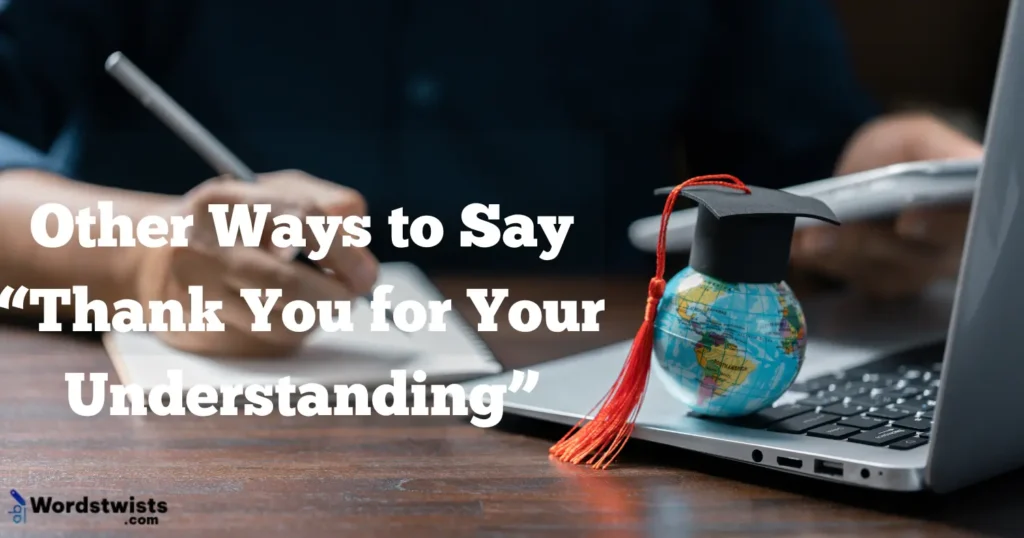Let’s be honest—we’ve all ended an email with “Thank you for your understanding” when something went wrong, got delayed, or needed patience. I used to rely on this phrase almost daily. Whether I was rescheduling a meeting or apologizing for a slow reply, it became my go-to. But after a while, it started to sound like a canned response instead of something real.
That’s when I started exploring better, more heartfelt alternatives. In this post, I’m sharing 25 thoughtful ways to say “Thank you for your understanding”—phrases that add personality, empathy, and warmth to your messages. These alternatives will help you sound more human, sincere, and professional, all at once.
So if you’re looking to upgrade your communication game, you’re in the right place. Let’s explore these options so your messages feel less robotic and more you.
Alternatives to “Thank You for Your Understanding”
1. I truly appreciate your patience
Explanation:
This phrase expresses gratitude clearly and personally. It makes the other person feel seen and respected for their patience.
Examples:
- “Sorry for the delay—I truly appreciate your patience.”
- “It took longer than expected. I truly appreciate your patience.”
- “Thank you again—I truly appreciate your patience during this process.”
- “We’re resolving it—I truly appreciate your patience in the meantime.”
- “It’s been a long week. I truly appreciate your patience while we catch up.”
Why it works:
It’s direct and heartfelt, with an emotional tone that builds trust.
2. Thank you for bearing with me
Explanation:
This informal, conversational phrase works well when you’re acknowledging a delay or a mistake with humility.
Examples:
- “It’s been hectic—thank you for bearing with me.”
- “We had some hiccups—thank you for bearing with me.”
- “Took longer than expected—thank you for bearing with me.”
- “Apologies for the mix-up—thank you for bearing with me.”
- “Still learning the ropes—thank you for bearing with me.”
Why it works:
It shows humility and humanity, making you more relatable.
3. I’m grateful for your flexibility
Explanation:
Perfect when someone adjusts their plans for you. It highlights their adaptability and consideration.
Examples:
- “I had to reschedule—I’m grateful for your flexibility.”
- “Plans shifted—I’m grateful for your flexibility.”
- “Thanks for adjusting the timeline—I’m grateful for your flexibility.”
- “Your changes helped a lot—I’m grateful for your flexibility.”
- “Couldn’t have done it without you—I’m grateful for your flexibility.”
Why it works:
It emphasizes appreciation for adaptation and collaboration.
4. Thanks for being so understanding
Explanation:
This one is casual and friendly. Great for emails, texts, or even in-person convos.
Examples:
- “Sorry I missed your call—thanks for being so understanding.”
- “We’re running late—thanks for being so understanding.”
- “Plans changed last minute—thanks for being so understanding.”
- “It’s been a rough week—thanks for being so understanding.”
- “I had to cancel—thanks for being so understanding.”
Why it works:
It’s warm and kind, helping maintain a positive connection.
5. I value your patience
Explanation:
This phrase sounds thoughtful and appreciative, especially in business or customer service.
Examples:
- “While we work through this, I value your patience.”
- “Our response time is slower—I value your patience.”
- “We’re on it—I value your patience during this delay.”
- “Thanks for hanging in—I value your patience.”
- “It’s been a long project—I value your patience throughout.”
Why it works:
It adds a professional tone and personal warmth in one sentence.
6. Your patience means a lot
Explanation:
This phrase feels personal and heartfelt. It’s a gentle way to express that you don’t take someone’s patience for granted.
Examples:
- “I know this took time—your patience means a lot.”
- “Thanks for sticking with me—your patience means a lot.”
- “We’re almost there—your patience means a lot.”
- “Delays happen, and your patience means a lot.”
- “This wasn’t easy, and your patience means a lot to the team.”
Why it works:
It sounds genuine and thoughtful, making the other person feel truly appreciated.
Read More: Other Ways to Say “Looking Forward” with Excitement
7. Appreciate you working with me on this
Explanation:
This phrase emphasizes collaboration and teamwork. It’s perfect when someone helps you through a tricky or delayed situation.
Examples:
- “It’s been messy, but I appreciate you working with me on this.”
- “You’ve been flexible—appreciate you working with me on this.”
- “I’m still catching up—appreciate you working with me on this.”
- “We’ve had some bumps—appreciate you working with me on this.”
- “Thank you for the support—appreciate you working with me on this.”
Why it works:
It builds a sense of partnership, which strengthens relationships.
8. Thanks for your support on this
Explanation:
Short and to the point, this phrase shows appreciation not just for patience, but also for emotional or logistical backing.
Examples:
- “Couldn’t have solved it alone—thanks for your support on this.”
- “You made this easier—thanks for your support on this.”
- “Delays happen—thanks for your support on this.”
- “The team appreciated your help—thanks for your support on this.”
- “I hit a rough patch—thanks for your support on this.”
Why it works:
It covers both empathy and action, making it well-rounded.
9. Thank you for your continued patience
Explanation:
Use this when the delay is ongoing. It shows that you recognize their ongoing effort to stay patient.
Examples:
- “We’re still working on it—thank you for your continued patience.”
- “Update coming soon—thank you for your continued patience.”
- “Delays are frustrating—thank you for your continued patience.”
- “Your calm approach helps—thank you for your continued patience.”
- “Hang tight—thank you for your continued patience while we fix this.”
Why it works:
It’s perfect for longer-term issues, and it reassures the reader that you haven’t forgotten.
10. Really appreciate your cooperation
Explanation:
This phrase is more formal and works well in customer service or team settings. It focuses on working together despite obstacles.
Examples:
- “We had to make changes—really appreciate your cooperation.”
- “Thanks for following the process—really appreciate your cooperation.”
- “It’s been a team effort—really appreciate your cooperation.”
- “You’ve been great—really appreciate your cooperation.”
- “Policy updates can be tough—really appreciate your cooperation.”
Why it works:
It’s professional and respectful, ideal for work or business settings.
11. Thanks for your grace
Explanation:
A short, elegant way to thank someone for being kind, patient, and forgiving—especially in tough moments.
Examples:
- “I was late again—thanks for your grace.”
- “The launch was bumpy—thanks for your grace.”
- “We made a mistake—thanks for your grace.”
- “You handled that so well—thanks for your grace.”
- “Apologies for the delay—thanks for your grace.”
Why it works:
It shows emotional intelligence and gratitude, all in just four words.
12. I’m thankful for your kindness
Explanation:
This phrase is gently emotional, great for more personal or heartfelt interactions.
Examples:
- “Your kind words helped—I’m thankful for your kindness.”
- “Through the chaos, I’m thankful for your kindness.”
- “You’ve been nothing but supportive—I’m thankful for your kindness.”
- “Thanks for the gentle approach—I’m thankful for your kindness.”
- “You’ve shown such patience—I’m thankful for your kindness.”
Why it works:
It’s especially meaningful when someone has shown compassion beyond expectations.
13. I appreciate your willingness to adapt
Explanation:
Ideal for changing plans, shifting timelines, or last-minute adjustments.
Examples:
- “We had to move fast—I appreciate your willingness to adapt.”
- “Things changed quickly—I appreciate your willingness to adapt.”
- “The schedule moved—I appreciate your willingness to adapt.”
- “You adjusted without a fuss—I appreciate your willingness to adapt.”
- “We’re doing our best—I appreciate your willingness to adapt.”
Why it works:
It thanks the person for being flexible and open-minded, not just patient.
14. Grateful for your open-mindedness
Explanation:
Use this when someone has been understanding in a situation that required empathy, growth, or change.
Examples:
- “We tried a new method—grateful for your open-mindedness.”
- “It wasn’t perfect—grateful for your open-mindedness.”
- “Thanks for hearing me out—grateful for your open-mindedness.”
- “Not everyone would’ve stayed calm—grateful for your open-mindedness.”
- “This was new for both of us—grateful for your open-mindedness.”
Why it works:
It highlights emotional maturity and mutual respect.
15. Your patience hasn’t gone unnoticed
Explanation:
This phrase shows deep appreciation and assures the reader their effort is recognized.
Examples:
- “You’ve been waiting a while—your patience hasn’t gone unnoticed.”
- “We’re doing our best—your patience hasn’t gone unnoticed.”
- “Thanks again—your patience hasn’t gone unnoticed.”
- “You stayed calm through all of it—your patience hasn’t gone unnoticed.”
- “We see your effort—your patience hasn’t gone unnoticed.”
Why it works:
It validates the person’s effort, making them feel seen and valued.
16. Sincerely appreciate your understanding
Explanation:
A formal, trustworthy tone. Best when you need to keep things professional yet warm.
Examples:
- “There’s been a delay—sincerely appreciate your understanding.”
- “Thanks for sticking with us—sincerely appreciate your understanding.”
- “We’re working through it—sincerely appreciate your understanding.”
- “It’s been unpredictable—sincerely appreciate your understanding.”
- “Thanks again—sincerely appreciate your understanding and support.”
Why it works:
It maintains a respectful, polished tone, especially in formal settings.
17. Thank you for staying patient
Explanation:
It’s a simple and kind acknowledgment that someone has waited longer than expected.
Examples:
- “We’re close to resolving it—thank you for staying patient.”
- “Still working on this—thank you for staying patient.”
- “I know it’s been slow—thank you for staying patient.”
- “Your support helps—thank you for staying patient.”
- “We hit a delay—thank you for staying patient.”
Why it works:
It’s great for repeated or ongoing delays, without sounding dismissive.
18. Thanks for your compassion
Explanation:
This phrase is meaningful when someone has shown empathy during a difficult time.
Examples:
- “You’ve been so kind—thanks for your compassion.”
- “I was struggling—thanks for your compassion.”
- “It’s been tough—thanks for your compassion through this.”
- “You didn’t have to be so understanding—thanks for your compassion.”
- “You gave me grace—thanks for your compassion.”
Why it works:
It expresses appreciation for emotional and personal support.
19. Appreciate your time and understanding
Explanation:
Shows that you value both the person’s time and patience, which makes it great for professional messages.
Examples:
- “I know this took longer—appreciate your time and understanding.”
- “Thanks for reviewing—appreciate your time and understanding.”
- “We’ll fix it—appreciate your time and understanding.”
- “Thanks for the call—appreciate your time and understanding.”
- “We’re grateful—appreciate your time and understanding throughout.”
Why it works:
It highlights two key areas: time + empathy—very effective in business.
20. Thank you for being patient through this
Explanation:
This shows appreciation for sticking around during a process or delay.
Examples:
- “The setup took longer—thank you for being patient through this.”
- “Our system was down—thank you for being patient through this.”
- “We’re fixing it—thank you for being patient through this.”
- “Things are back on track—thank you for being patient through this.”
- “It’s been a process—thank you for being patient through this.”
Why it works:
It shows you’re aware the process wasn’t smooth and appreciate their endurance.
21. Your flexibility helped a lot
Explanation:
Highlights the positive impact of the other person’s adaptability.
Examples:
- “We changed plans—your flexibility helped a lot.”
- “The shift was tricky—your flexibility helped a lot.”
- “We made adjustments—your flexibility helped a lot.”
- “Rescheduling wasn’t easy—your flexibility helped a lot.”
- “Thanks again—your flexibility helped a lot.”
Why it works:
It emphasizes how their attitude made things better.
22. Thanks for going with the flow
Explanation:
Casual and friendly, this phrase fits relaxed conversations when plans change.
Examples:
- “We had some curveballs—thanks for going with the flow.”
- “It’s been unpredictable—thanks for going with the flow.”
- “We switched gears—thanks for going with the flow.”
- “Plans changed—thanks for going with the flow.”
- “I appreciate your ease—thanks for going with the flow.”
Why it works:
It’s great for informal or creative settings, where flexibility is key.
23. I’m lucky to have your support
Explanation:
Warm and heartfelt—ideal for close colleagues or personal messages.
Examples:
- “Couldn’t have done it without you—I’m lucky to have your support.”
- “Your help means the world—I’m lucky to have your support.”
- “Through the stress—I’m lucky to have your support.”
- “You stayed steady—I’m lucky to have your support.”
- “It’s been a ride—I’m lucky to have your support.”
Why it works:
It adds a personal thank-you with real emotion.
24. Thank you for sticking with me
Explanation:
This feels very human and raw. It’s perfect for when someone stayed loyal or helpful in a rough patch.
Examples:
- “Things got rocky—thank you for sticking with me.”
- “I wasn’t at my best—thank you for sticking with me.”
- “Still figuring it out—thank you for sticking with me.”
- “We made it through—thank you for sticking with me.”
- “Sorry for the mess—thank you for sticking with me.”
Why it works:
It’s emotionally real, perfect for deep professional or personal connections.
25. Couldn’t ask for more understanding
Explanation:
This phrase expresses deep appreciation in a humble and admiring way.
Examples:
- “You’ve been amazing—couldn’t ask for more understanding.”
- “It’s been chaotic—couldn’t ask for more understanding.”
- “You made it easier—couldn’t ask for more understanding.”
- “Honestly—couldn’t ask for more understanding.”
- “You’ve shown patience and care—couldn’t ask for more understanding.”
Why it works:
It makes the person feel extra appreciated, like they’ve gone above and beyond.
Final Thoughts
Saying “thank you” doesn’t have to sound cold or copy-pasted. When you use these alternative phrases, you’re not just expressing gratitude, you’re making your emotional intelligence, professionalism, and personality shine. Whether it’s a team delay, customer support issue, or personal struggle, these phrases will help your words feel real and respectful.

I’m Leo Knox, the wordplay wizard behind WordsTwists.com where I turn everyday meanings into funny, clever, and creative twists. If you’re tired of saying things the boring way, I’ve got a better (and funnier) one for you!


